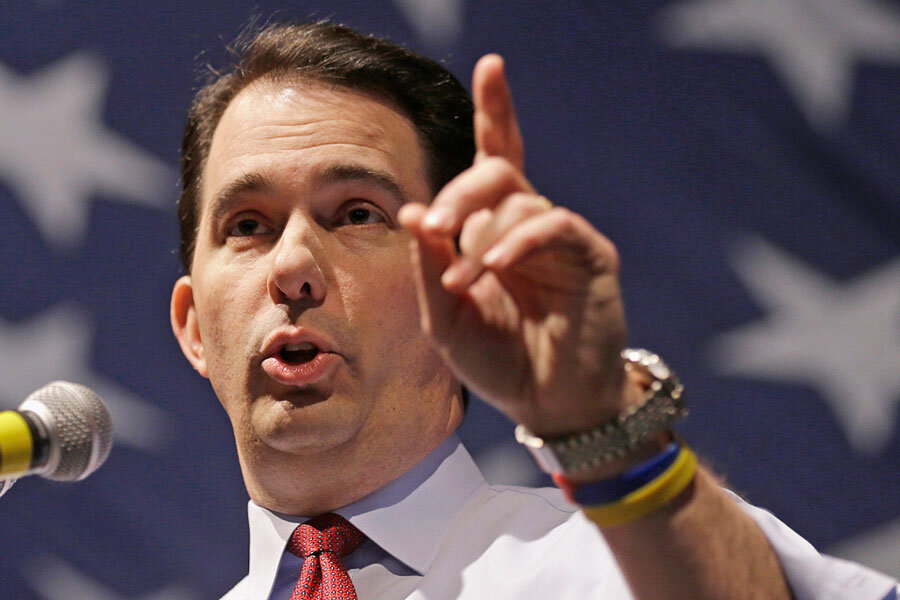Wisconsin anti-union law: state Supreme Court ruling probably the final say
Ever since it became law in 2011, Act 10 in Wisconsin – which essentially ended collective bargaining for most public workers – has sparked countless court challenges, generated angry protests at the State Capitol, and fueled a recall campaign of the governor.
A ruling Thursday by the state Supreme Court indicates the law will stand, leaving opponents with little choice but to move on.
“This is the end of the pending challenges and is unlikely to be replaced by some persuasive new challenge that hasn’t already been attempted,” says Charles Franklin, a law professor and polling director at Marquette University in Milwaukee.
The 5-to-2 decision found that Act 10 does not violate the First Amendment, because collective bargaining powers by labor organizations are a benefit, not an enshrined constitutional right at the federal or state level.
“No matter the limitations or ‘burdens’ a legislative enactment places on the collective bargaining process, collective bargaining remains a creation of legislative grace and not constitutional obligation. The First Amendment cannot be used as a vehicle to expand the parameters of a benefit that it does not itself protect,” Justice Michael Gableman wrote in the ruling.
Act 10 survived multiple legal challenges. One decision late last year overturned a contempt-of-court order by a Dane County circuit judge who had ruled that the law was unconstitutional. A federal court struck down parts of the bill in March 2012, but was overturned by a federal appeals court last year after the state sued.
The issue also catapulted Wisconsin Gov. Scott Walker (R) into the national spotlight, making him a pariah to Democrats and a hero to Republicans. He survived a 2012 recall election, which emboldened his message that Act 10 will benefit the state economy.
Governor Walker released a statement Thursday saying Act 10 saved taxpayers “more than $3 billion,” calling it “a victory for those hard-working taxpayers.” The majority of savings cited by Walker are accurate, local media report, although they say that morale among state workers has been damaged and recruitment may be difficult.
Act 10 is not necessarily threatened by the upcoming gubernatorial election, either. Mary Burke, a former state secretary of Commerce and Walker’s Democratic opponent in November, has backed away from pledging to overturn the law, even though she says she supports the ability of public workers to collectively bargain. One reason for her position, according to Professor Franklin: Public opinion polls show that most voters agree with elements of the law requiring public workers to contribute more to their retirement and health-care benefits.
Another reason is practical: Ms. Burke would have no power to overturn the law with both legislative chambers expected to remain under Republican control.
“Without Democratic control of both houses, the governor’s prospect of repealing Act 10 is extremely limited,” Franklin says. “We’re looking at more years and more election cycles before it can be plausible to see a substantial change in the law.”
Act 10’s passage has emboldened Republican governors in nearby states like Indiana and Michigan to successfully push through similar bills, although Franklin says those efforts will be sustained only if Republicans have a lock on all branches of government.
“At this point, [collective bargaining] is not an area that lends itself to compromise between Republican governors and Democratic legislatures. Both sides are too influenced by interest groups and core supporters that would make it very unlikely for states to go halfway on this issue,” he says.
Justice N. Patrick Crooks, who agreed with the majority Thursday, suggested in his opinion that collective bargaining does have a place within labor negotiations, even if it is not a right.
“As thoughtful people from across the political spectrum and around the world have long recognized, collective bargaining benefits workers, employers, and society itself,” he wrote. “Although Act 10 does not violate either the United States Constitution or the Wisconsin Constitution, it erodes longstanding benefits to both public workers and to public employers.”









